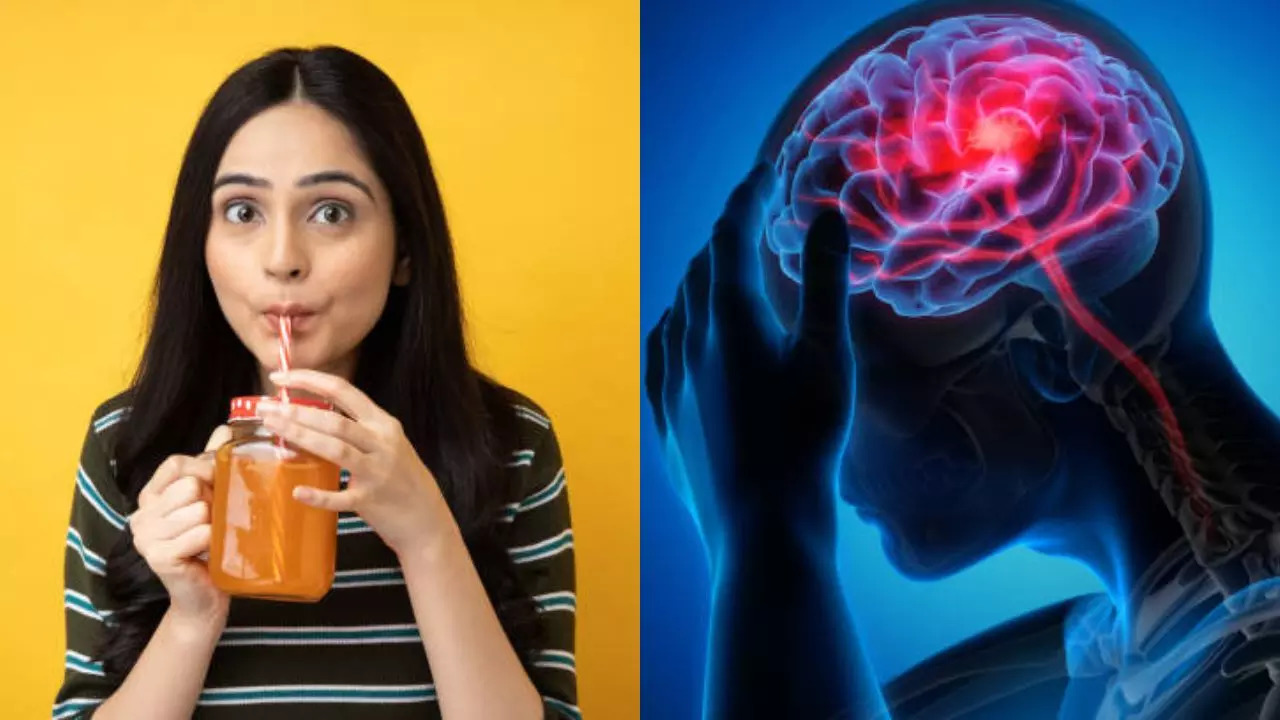Contents
-
news
-
Health
Forget soda, fruit juice can also give you a stroke, study says; This way
According to new findings, drinking fruit juice frequently increases the risk of stroke. Research published in the Journal of Stroke found that drinking fruit juice causes an immediate sugar release, leading to a rapid increase in blood sugar and insulin levels – promoting inflammation in the blood vessels and causing a life-threatening condition. it occurs. Read on to know how to alleviate this condition.

High amounts of sugar overstimulate your nervous system, causing stress in the blood vessels – which ultimately leads to stroke.
While sodas and fizzy drinks have always earned a bad reputation for causing serious health conditions – including cardiovascular problems and stroke, even fruit juices are not far behind. According to a new study, fruit juice increases the risk factor of having a stroke by 22 percent.
Recent research conducted by experts from Galway University, McMaster University, Canada and an international group of stroke experts showed that if you are drinking fruit juice two or three times a day, the risk doubles. According to scientists, juices are “nothing more than sugar syrup with no nutritional value”. This can increase the chance of having a stroke by 37 percent and women are likely to be at greater risk than men.
The study, published in Stroke Journal, It was also found that drinking more than four cups of coffee per day also increases the risk of stroke.
How does fruit juice increase the risk of stroke?
According to experts, a major health disadvantage of drinking juice is the lack of fiber – which helps regulate digestion and takes care of your gut health. Juicing fruits causes an immediate sugar release, causing a rapid increase in blood sugar and insulin levels – which promotes inflammation.
High amounts of sugar overstimulate your nervous system, causing stress in the blood vessels – ultimately leading to life-threatening problems like stroke.
“NheyAll fruit drinks are created equal – freshly squeezed fruit juice is most likely to provide benefits, but fruit drinks made with too many added sugars and preservatives can be harmful. Our research also shows that the risk of stroke increases the more often someone consumes fizzy drinks,” said lead researcher Professor Andrew Smith, Professor of Clinical Epidemiology at the University of Galway and Consultant Physician at Galway University Hospitals. Said.
To reduce this, doctors recommend drinking more water – at least seven to eight glasses a day, as this also helps hydrate you. He said, “As a doctor and as someone who has researched stroke risk, we encourage people to avoid or reduce their intake of fizzy and fruit drinks and consider switching to water instead.” Will encourage for.”
How was the study conducted?
According to the researchers, the study focused on people’s intake of fizzy drinks and fruit juices and found:
The association between fruit juice and higher chances of stroke was greatest in Eastern/Central Europe and the Middle East, Africa and South America. Research suggests that many products marketed as fruit juice are made from concentrate and contain added sugars and preservatives, which may reduce the benefits typically associated with fresh fruit and increase the risk of stroke. Can increase.
The risk of stroke is most increased in women due to bleeding associated with fruit juices or drinks.
What happens in an instant?
If you have a stroke, the blood supply to part of your brain is cut off, causing brain cells to be damaged. Doctors say it could be either an ischemic stroke, which is usually caused by a blood clot, or intracerebral hemorrhage – which causes bleeding in the brain tissue.
INTERStroke is also one of the largest international studies of stroke risk factors, involving almost 27,000 people from 27 countries, including about 13,500 who had experienced their first stroke.
Get the latest news live on Times Now with breaking news and top headlines from around the world.


